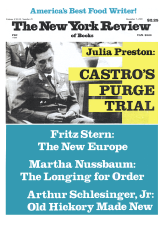We are accustomed to speak of covert warfare as an instrument of foreign policy when, in truth, its commonest form is as a domestic expression of government’s belligerence against segments of its own citizenry.
The Federal Bureau of Investigation’s war on the National Lawyers Guild began with a break-in and burglary of the files in the guild’s office in 1941. The subsequent campaign of alarms, surprises, night raids, and harassments went pitilessly on for at least thirty-six years while its commanders kept a secret that would be shielded by official denials until the Department of Justice admitted it only in early October.
The justice department’s concession skimped on the details of this protracted engagement and, if it finds an historian, he must depend on the documents that the Lawyers Guild had to sue to force the attorney general to surrender. Government is as disinclined to assist its victims as it was inclined to torment them and, when it has to give ground, it gives it inch by inch and always with as due possible deference to its cardinal principle never to apologize and never to explain.
The Lawyers Guild never had many more than two thousand members before the 1950s, when it became so unpopular and dangerous to know that it couldn’t count more than five hundred. The FBI would seem to have done its work by then, and yet its efforts were more insensate than ever. Nothing, apparently, could quite so infuriate Hoover as success.
The guild drew its small cadres from lawyers of the left. A few of its activists were, however, so reputable at the outset of the FBI’s war that once, when Hoover pressed Attorney General Tom Clark to add the Lawyers Guild to his list of subversive organizations, Clark replied that he would never do any such thing because some of these people were friends of his.
Fervently as Hoover tried, he could never quite get the guild certified as subversive, and most of his excesses were indulged without officially superior warrant. That inhibition was, of course, a nullity for an FBI director whose distaste for Americans who criticized their government was tepid beside his hatred of those who criticized him.
The Justice Department admits that the FBI brought off seven snatch-and-grab jobs in various offices of the Lawyers Guild. That is at the very most about half the actual count. Hoover also seeded the guild with informants. The beginnings were modest. In 1951, its single trust-worthy agent on the guild’s national executive board was a law student, and it lost him upon his graduation.
Within ten years, the bureau had so fertilized its garden that Paul Zuber, an Afro-American lawyer, was tirelessly preaching militance to his fellow national board members and reporting every intimacy of their debates to the FBI. Louise Reese, executive secretary of the guild’s Washington branch, served the same function as zealously, and she had comrade-informants strategically placed in at least six other cities.
What is especially unappetizing about these maneuvers is that they were directed against lawyers. The guild’s members were by then all but outcasts, and so were their clients. The FBI was spying on lawyers representing people in trouble with the government, and one fruit of these researches must inevitably have been the defense strategy for some unfortunate the government was prosecuting.
Domestic covert warfare has no existence as a current event. We never know about it until it is revealed to us as the history that government admits only after assuring us that it has stopped. When it is going on, it is noticed by no one who wants to be thought reasonable, and anyone who speaks of it is dismissed as irrational. Our secret wars at home are never said to happen as long as they are going on, and mightn’t we wonder whether one is happening right now when all we know about it is that it isn’t?
This Issue
December 7, 1989



